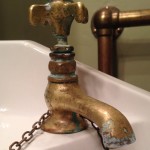 The last time I talked about hard water and eczema was in my blog in April of last year.
The last time I talked about hard water and eczema was in my blog in April of last year.
[http://sandyflann.com/dr-sandy-flanns-blog/the-role-of-water-softeners-in-eczema]
The advice at the time, from a large, multicenter, randomized controlled trial was that ion-exchange water softeners could not be recommended in the treatment of moderate to severe eczema in children.
[Thomas KS, Dean T, O’Leary C et al. A randomized controlled trial of ion-exchange water softeners for the treatment of eczema in children. PLoS Medicine 2011; 8(2): e1000395.]
So, what’s changed?
However, having just returned from the recent International Symposium on Atopic Dermatitis (ISAD) conference in Nottingham, it seems that things have moved on, as always in science.
Interestingly there is evidence to show that hard domestic water does increase the risk of developing infantile eczema.
[Flohr C, England K, Marrs T et al. Hard domestic water increases the risk of developing infantile eczema. Oral and poster presentation, 8th Georg Rajka Symposium May 2014.]
This study looked at 1303 infants in England and Wales aged 3 months of age. Calcium carbonate concentration in domestic water was found to be significantly associated with eczema by the age of 3 months.
Why is this different to the previous advice?
The pH or level of how acid or alkali the skin surface should be is actually 5.5 (in the acidic range) after the first year of life. This pH is important in maintaining a healthy skin barrier.
[Danby S & Cork M. The skin barrier in atopic dermatitis. In: Harper’s Textbook of Pediatric Dermatology (Irvine A., Hoeger P & Yan A. eds) 3rd edn. Oxford, UK, Blackwell Science Ltd.: p317-335.]
Water alone can increase the skin pH from 5.5 to 7.5.
[Tsai T & Maibach H. How irritant is water? An overview. Contact dermatitis 1999; 41(6): 311-4.]
Soaps can further increase the skin pH to 8 at which point the there is breakdown of the skin barrier.
[Lavender T, Bedwell C, Roberts S et al. Randomized, controlled trial evaluating a baby wash product on skin barrier function in healthy, term neonates. J Obstet Gynecol Neonatol Nurs, 2013; 42: 203-14.]
Where does hard water come into it?
Hard water, with high levels of calcium in it, impairs the ability of the skin to repair itself and also keeps the pH of water high.
The ion-exchange water softeners worked by replacing the calcium in water with sodium which is also alkaline, ie keeps the pH of water high. It was therefore not surprising that the water softener trial showed no benefit in eczema.
What is the solution?
Current thinking is to see if removing the calcium from domestic hard water, ie chelating the entire calcium salt makes any difference. There are currently trials underway to see if new scientifically engineered creams (or humectants) can chelate calcium on the skin at the same time as improving skin barrier function.
So watch this space…
Regards,
Sandy
Dr Sandy Flann, Consultant Dermatologist
